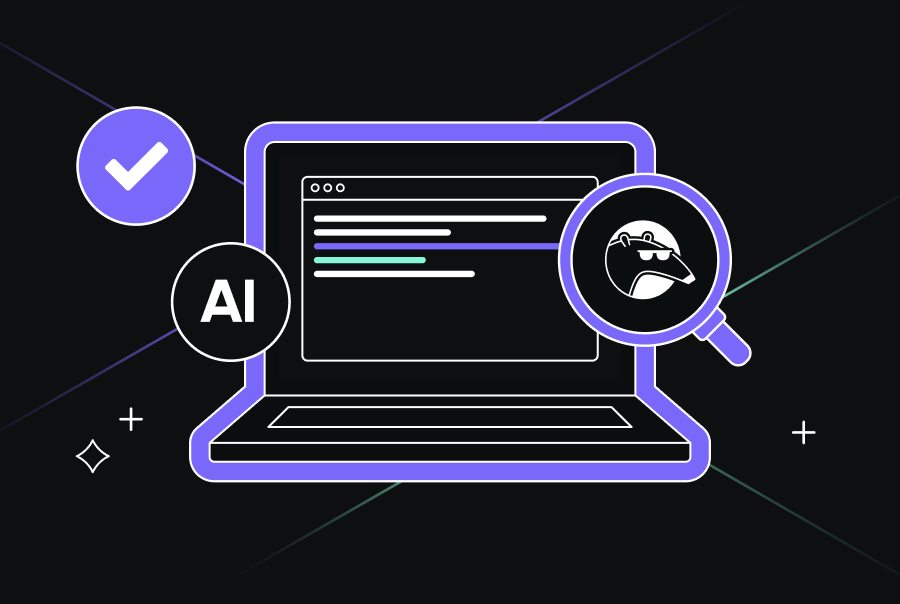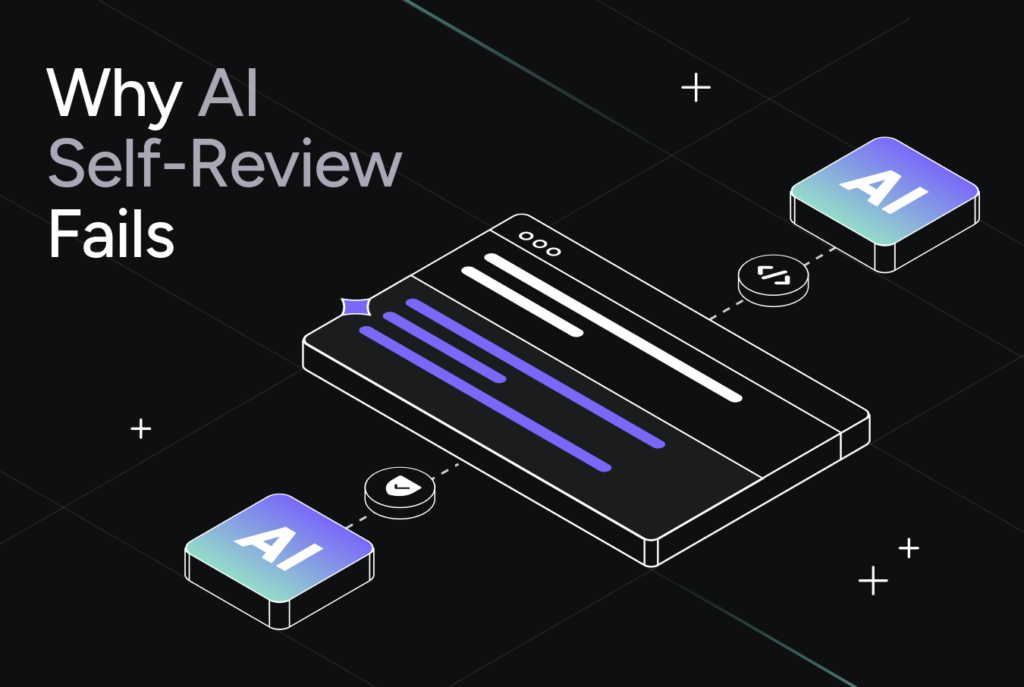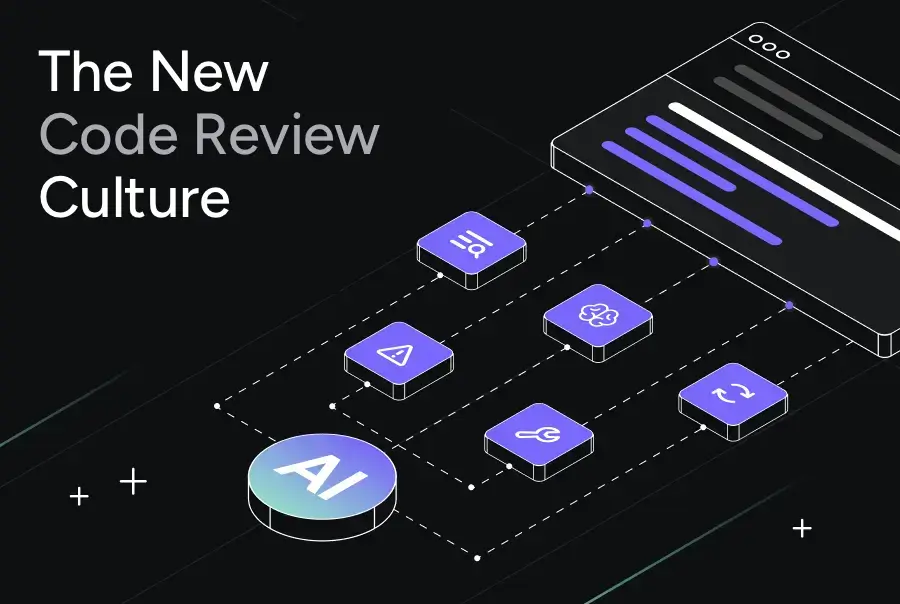Introducing Qodo’s Context Engine: Deep Codebase Intelligence for Enterprise Development
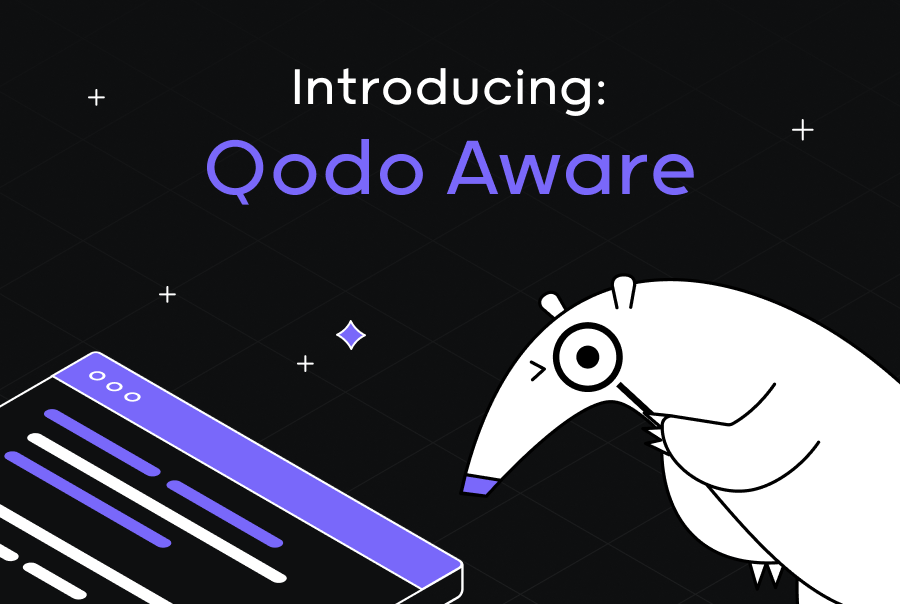

Today, we’re introducing Qodo’s context engine, the first production-ready context system, purpose-built for deep research of large, complex codebases. Qodo indexes, understands, and reasons across your entire codebase to power smarter development.
With the context engine, you get AI that understands your codebase as deeply as your principal engineers do through:
- Multi-repo indexing and state-of-the-art context engineering so you can ask any question and get grounded answers about your codebase
- Intelligent agent modes, including deep research and issue finder, that investigate, analyze, and solve multi-faceted technical challenges.
- MCP and API integration to bring codebase intelligence to wherever you work.
Context isn’t optional, it’s everything.
Picture this. You’re debugging a production issue. The error traces through six different microservices, each in its own repository. Your AI assistant can help you write a fix, if only you could explain the entire system architecture, data flow, dependencies, and three years of architectural decisions that led here.
The truth is your AI coding assistant is flying blind. It sees the file you’re editing, maybe imports a few dependencies, but is probably missing 99% of the context that actually matters.
This isn’t a minor inconvenience. These findings from our 2025 State of Code Quality report show that it’s the reality for 65% of developers who report that AI tools miss critical context during their most important tasks. It’s why developers still spend 60-70% of their time just understanding code, and why 44% of those who say AI degrades code quality blame context gaps.
Without context, traditional AI fails on three fundamental levels:
Nothing exists in isolation, but AI acts like it does: That simple utility function? It’s called by 18 different services. That database schema change? It impacts three teams you’ve never met. That innocent-looking API endpoint? It’s the lynchpin of your largest customer’s integration.
Why “move fast and break things” breaks down: When AI lacks context, it doesn’t just break things, it breaks them in subtle, cascading ways that only surface weeks later. A performance regression here, a security vulnerability there, a violated business constraint that nobody catches until it hits production.
The difference between code that works and code that fits: Any AI can generate syntactically correct code. But code that follows your team’s patterns, respects your architectural decisions, and integrates smoothly with existing systems? That requires understanding not just what your code does, but why it does it that way.
Architected for complete codebase understanding
The context engine isn’t another RAG system bolted onto an LLM. It’s a purpose-built context engine that uses state-of-the-art agentic context engineering to truly understand your codebase at scale.
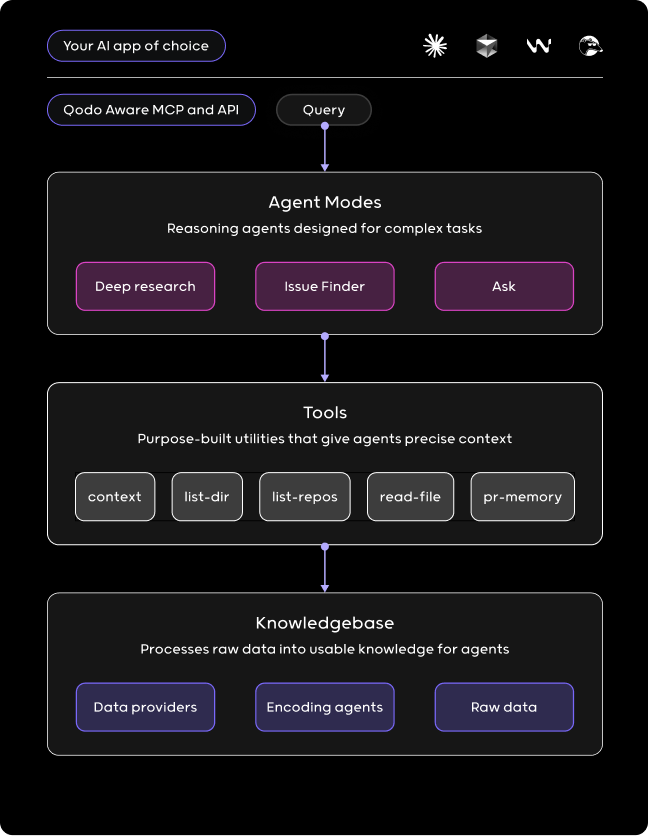
The agentic approach
Qodo not only retrieves context, it reasons through problems the way your most senior engineers do. When you ask a question, Qodo doesn’t just search for keywords. It understands intent, traces implications, reasons over context and considers the broader system impact.
Depending on the task, user can interact with the context engine
Deep Research Agent: For complex architectural questions or cross-repository planning, this mode performs thorough investigation, analyzing dependencies and impacts across your entire system.
Ask Agent: Get immediate, accurate answers about any part of your codebase, from API contracts to deployment configurations, complete with code references and examples from your actual implementations.
Issue Finder Agent (Beta): Identifies problems that span multiple repositories or services, the kinds of issues that typically only surface in production.
Purpose-built tools for precise context
Qodo’s power comes from a sophisticated system beyond RAG, where specialized tools access pre-indexed codebase data, and agents orchestrate which tools to use based on the task at hand.
The agents orchestrate various tools to gather information:
- context: Retrieves code context around specific functions/files
- list-dir: Explores directory structures
- list-repos: Shows available repositories
- read-file: Reads specific file contents
- pr-memory: Accesses historical pull request information
For example, for a production bug, the agent might start with error pattern matching, progress to dependency tracing to find root causes, then examine recent PRs for related changes. Each step informs the next, with the agent adapting its approach based on what it discovers.
Each tool is designed to provide exactly the right context for the task at hand, whether you’re debugging a production issue or planning a major refactor.
Amplify AI tools with codebase understanding
The context engine isn’t locked into a single interface. It’s designed as a flexible context engine that enhances any AI tool through the Model Context Protocol (MCP). This means you can bring deep codebase understanding to wherever your team already works, without forcing another tool migration.
Through MCP integration, Qodo transforms any AI assistant into a codebase expert. Whether your team uses Claude, Cursor, Windsurf, or custom internal tools, Qodo provides the same deep contextual intelligence:
- Claude Desktop: Ask natural language questions about your codebase directly in Claude’s interface
- Cursor/Windsurf: Get context-aware code suggestions that understand your entire architecture
- Custom Tools: Integrate via API to enhance your internal developer platforms
- CLI Tools: Access Qodo context engine intelligence directly from your terminal
Qodo’s context engine is offered at the enterprise level, but we’ve indexed over 100 open source repos so you can try it out for free in any AI tools you use for software development. Just copy and this MCP configuration file:
{
"open-aware": {
"command": "npx",
"args": [
"mcp-remote",
"https://open-aware.qodo.ai/mcp/"
]
}
}
The intelligence core of Qodo’s Platform
While Qodo’s context engine can be used as an MCP , it also serves as the foundational intelligence layer for Qodo’s entire code review platform:
Powering Qodo in the IDE: When generating code in your IDE, the context engine ensures suggestions follow your team’s patterns, respect architectural boundaries, and reuse existing utilities rather than creating duplicates.
Enhancing PR review: During PR reviews, the engine provides the context that detects duplicated logic within and across repos.
Enabling agentic quality automation: build custom agents that leverage codebase context.
Putting Qodo to the test: the DeepCodeBench Benchmark
To ensure our context engine delivers on its promise of superior context understanding, we created DeepCodeBench, a rigorous benchmark that measures how well AI agents retrieve and apply context from real-world codebases.
Existing benchmarks fail to capture the complexity of enterprise development—they test AI on artificial code snippets or single-file contexts, but real development requires understanding relationships across dozens of files, tracing dependencies through multiple services, and grasping architectural patterns that span entire repositories.
To address this gap, we created DeepCodeBench: 1,144 carefully curated questions derived from actual pull requests in eight major open-source repositories, each requiring deep retrieval across multiple files.
Qodo’s deep research agent achieves 80% fact recall accuracy—outperforming alternatives like OpenAI’s Codex (74%), Claude Code (64%), and Gemini CLI (45%). But accuracy is only part of the story. Qodo processes these complex queries in just 45 seconds on average, compared to 92-98 seconds for comparable tools.
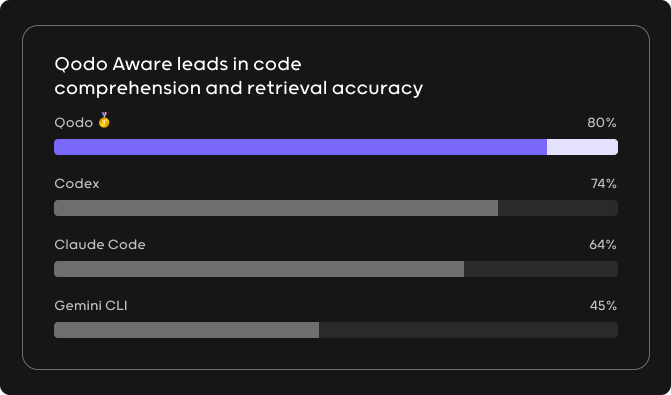
More importantly, Qodo performs equally well on both “deep” questions (specific implementation details) and “broad” questions (system-wide architecture), while other tools struggle with cross-file context. This consistent performance across question types validates our approach to multi-repository intelligence and semantic understanding.
The benchmark is open-source, allowing anyone to verify our claims and test their own solutions. Read the full technical details and access the dataset.
Qodo’s context engine in in action
Here are some examples were you can use the context engine across your SDLC.
Strategic Planning with Complete Visibility
When architecting new features or planning migrations, Qodo transforms overwhelming complexity into actionable intelligence. Consider a typical enterprise challenge:
Prompt: “Help me plan migration of all microservices from legacy auth to [email protected]”.
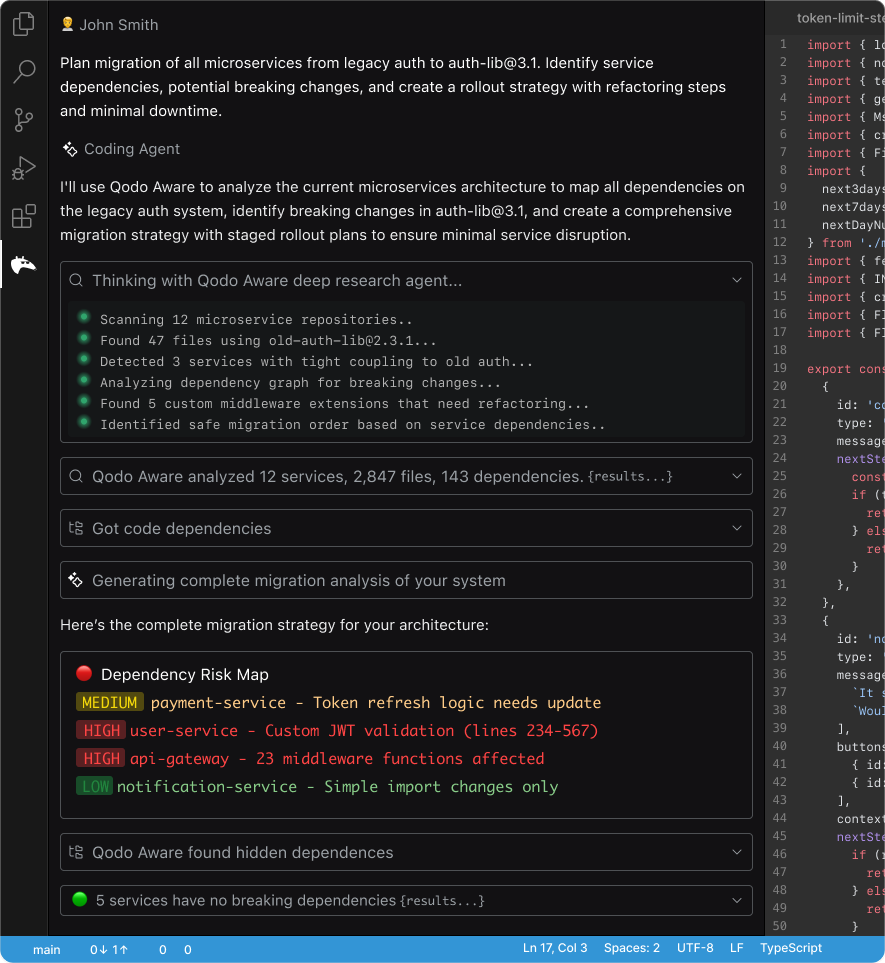
Qodo doesn’t just reveal problems, it maps solutions.
Within seconds, discover that 47 services use the old authentication, but more importantly, you get actionable intelligence: 12 services just need a simple import change, 23 require middleware updates but have examples from already-migrated services, and only 3 have breaking changes requiring custom JWT validation that conflicts with the new library.
Intelligent Code Review That Prevents Debt
Instead of reviewers manually searching for similar patterns or discovering duplication after merge, Qodo proactively identifies duplicate implementations and generates specific recommendations for code consolidation. In the example below, Qodo discovers that threshold logic already exists elsewhere in the codebase. It suggests extracting shared functionality into reusable utilities, preventing technical debt before it enters your main branch.
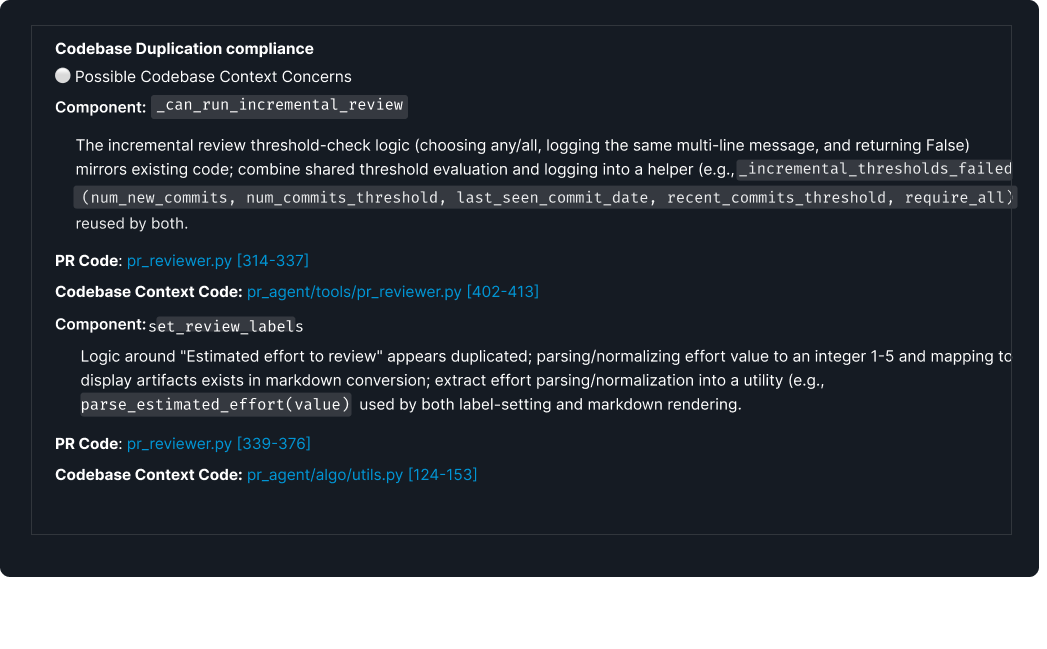
Start Today
For Individual Developers: Experience Qodo’s context engine immediately with our free MCP for open-source repositories. Install it in minutes and see how deep context transforms your development workflow. Get started with the open-source version.
For Teams and Enterprises: Close the context gap across your entire organization. Schedule a demo to see Qodo on your codebase.
